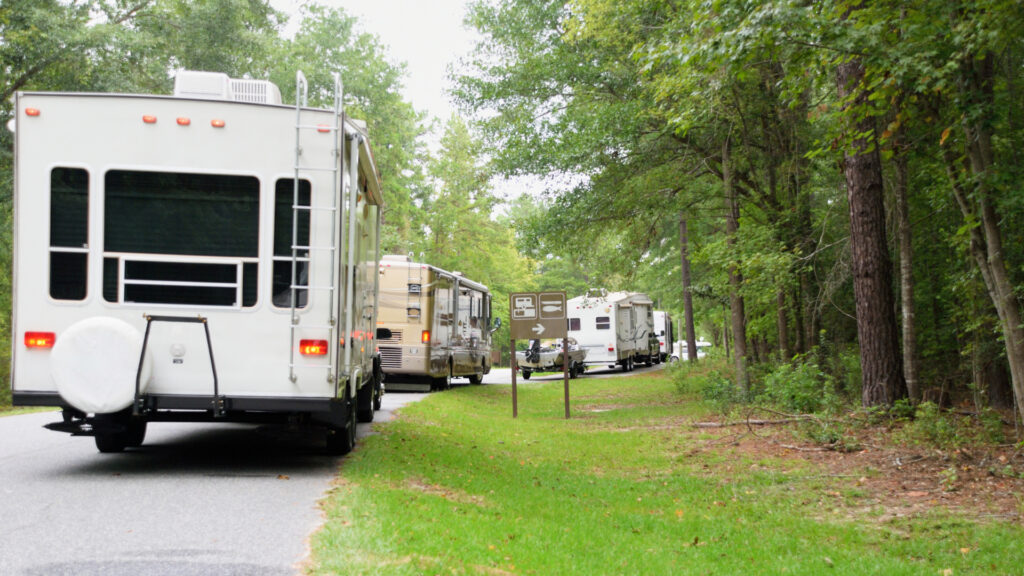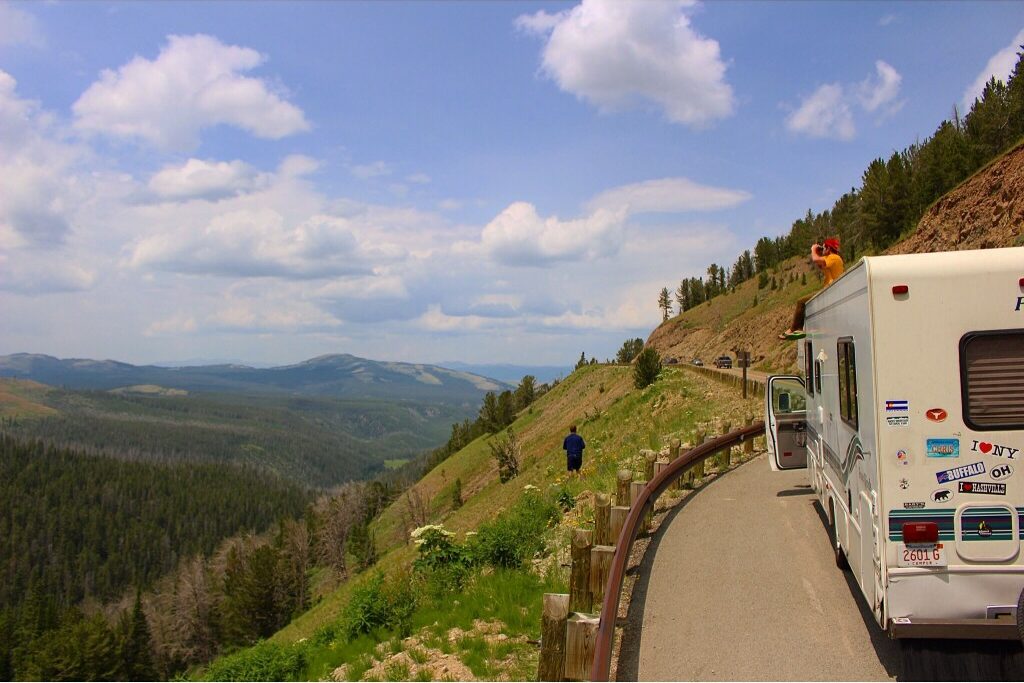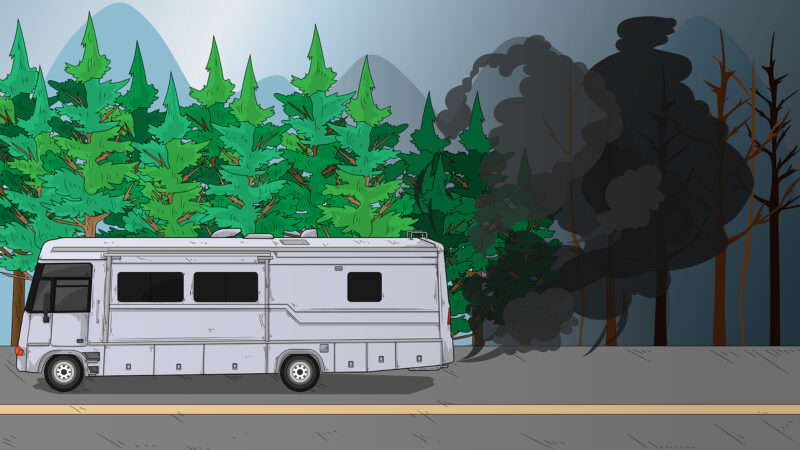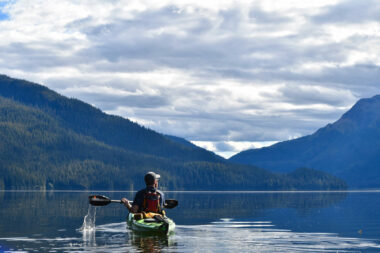Table of Contents Show
As you roam from place to place in your home on wheels, you might do some soul searching, too. If you’re like us, maybe you’ve wondered whether your chosen lifestyle is doing more harm than good.
Are we helping to destroy the outdoors that we love so much? Climb aboard as we take a look at RVs and how big a footprint they leave.
Are RVs Bad for the Environment?
We often see ourselves as carefully creeping around the sensitive natural areas we love visiting. But are we treading too heavily? We think not.
Our research shows that, yes, of course, RVs do have an impact on the environment. But, all in all, our style of living is less detrimental than others. Because of healthy, eco-friendly trends in the RV industry, the overall impact is lessening as time goes on.

7 Ways That RVing Is Actually More Eco-Friendly Than a House-Bound Lifestyle
Sustainability is a way of life for many RVers, not just a popular buzzword. How does the nomad life stack up against sticks and bricks? The fact that we’re conservation-minded by nature weighs heavily in our favor, but it’s not the only factor. Here are some points to consider.
Most RVers Conserve Water
When you don’t live on the road, you might want to indulge in a long, hot shower. If the forecast calls for hot and dry, you may not think twice about switching on your lawn sprinkler. You might even carelessly toss out that half-drunk glass of ice water.

All of these things are unheard of when camping. RVers tend to gear toward watching every drop. This water conservation adds up to many gallons over time.
Keep in Mind: Use even less water by choosing the best shower head designed for water conservation and RV living.
Many RVers Generate Their Own Energy
How many of your friends or relatives have solar panels and inverters on the roof of their house? Some, but not many.
Besides carefully conserving energy, another big part of the RV lifestyle is generating more. This allows us to stay off the grid and disconnect, sometimes for days or weeks at a time.
Many RVers Adopt Low-Waste Lifestyles
“Waste not, want not” might be words that your grandma swore by, and they make even more sense these days. With a leave-no-trace philosophy, campers know that what they bring in, they have to take out.
Adopting a low-waste way of life means constant conscious decisions not to use something if you don’t need to. Plus, RVers like to avoid single-use items. Small examples include plastic straws and bags, but they can add up to a big change in your daily life.
Full-Time RVers Are Minimalists
Frugality is almost a badge of honor in RVing circles. We constantly find new ways to stretch our budget and specialize in packing small and light. After all, every ounce counts toward a weight limit. Once you get into the minimalist habit, it doesn’t go away. We simply get used to doing more with less.
Most RV Products Are Environmentally Friendly
RV components like composting toilets and low-flow faucets have the environment in mind. This mindset extends to other products.
Many RV cleaning products don’t use harsh chemicals. Lots of our campsite cohorts use cloth napkins and reusable plates and dishes. We see lots of clotheslines stretched out, too.
Pro Tip: Be environmentally conscious and avoid dealing with a black tank with a composting toilet for your RV.
Many RVers Use Diesel, Which Burns Cleaner Than Gasoline
The big Class A “diesel pushers” burn diesel rather than gasoline, and so do many smaller RVs. Some people prefer to use diesel with their generators, too. Besides offering better engine performance, diesel has fewer toxic emissions, including carbon dioxide. This means diesel burns cleaner than gas.
The Carbon Footprint of a Full-Time RVer is Smaller Than That of Someone in a House
Despite the image we may have as being free-wheeling vagabonds, most RVers are pretty disciplined travelers. Heading off willy-nilly without a plan isn’t cost-effective. In fact, many RVers like to travel only a few hours and stay put for several days. This is quite a contrast to “regular folks” who commute to and from work five or more times a week.
In fact, studies show that nearly a third of all greenhouse gases come from transportation. So it feels good to avoid the gridlock and not contribute to that kind of pollution every day.
In terms of a carbon footprint, this lack of daily driving goes hand in hand with using less water and generating less trash. We use a fraction of the water that a household consumes, and, at our best, we hardly generate any garbage.

RVs Are Becoming More Eco-Friendly Than Ever
All-electric RVs aren’t here yet, but many industry watchers believe they lie just over the horizon. In the meantime, we’ve already seen many trends toward a greener future. Modern RVs come more compact with much lighter materials. We may take the composite Azdel panels for granted, but they replace heavier construction materials like wood and metal.
This move toward more lightweight RV trailers means you can get by with a smaller tow vehicle. You might even use a crossover SUV or a station wagon that you already own. Not having to acquire a big fuel-guzzling truck as a second vehicle means fewer emissions.
Companies have begun using more sustainable materials, too. These include bamboo and birch, both of which are plentiful and grow fast. Modern trailers and motorhomes also have factory options to generate more solar power than ever before. Up until recently, these were almost always after-market improvements.
We have also seen more RVs that come standard with more efficient, energy-saving appliances. In fact, most of the industry trends gear toward being more environmentally friendly, not less. It just makes sense, and it’s also what the customers want.
RVing Might Seem Detrimental to the Environment, But It’s Not as Bad as You’d Think
More people than ever embrace the RV lifestyle. Some may have images of fume-spewing beasts trampling the earth, but we think reality paints a different picture. Overall, our community is environmentally conscious, and it improves all the time.






